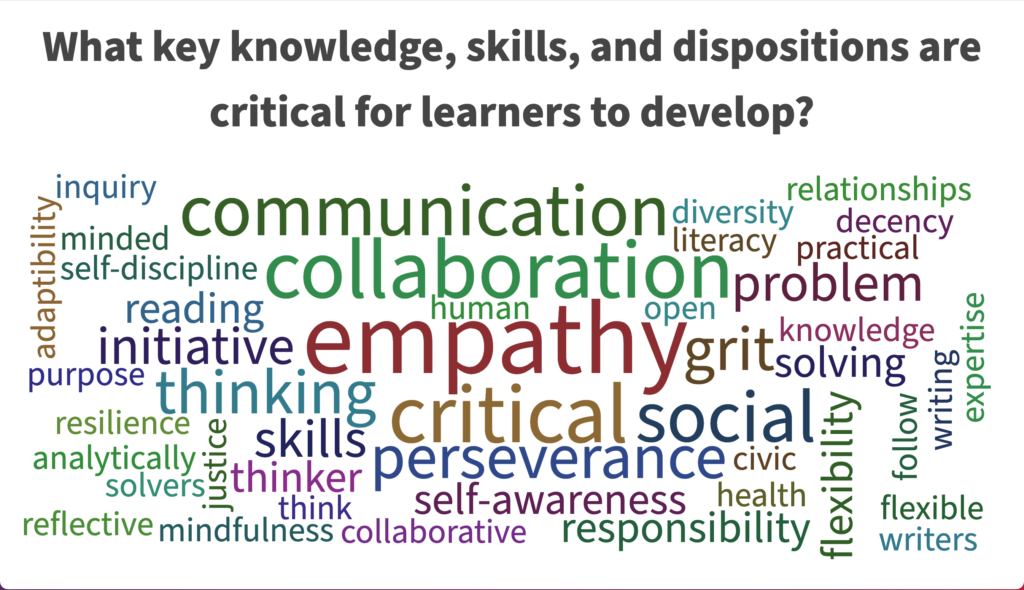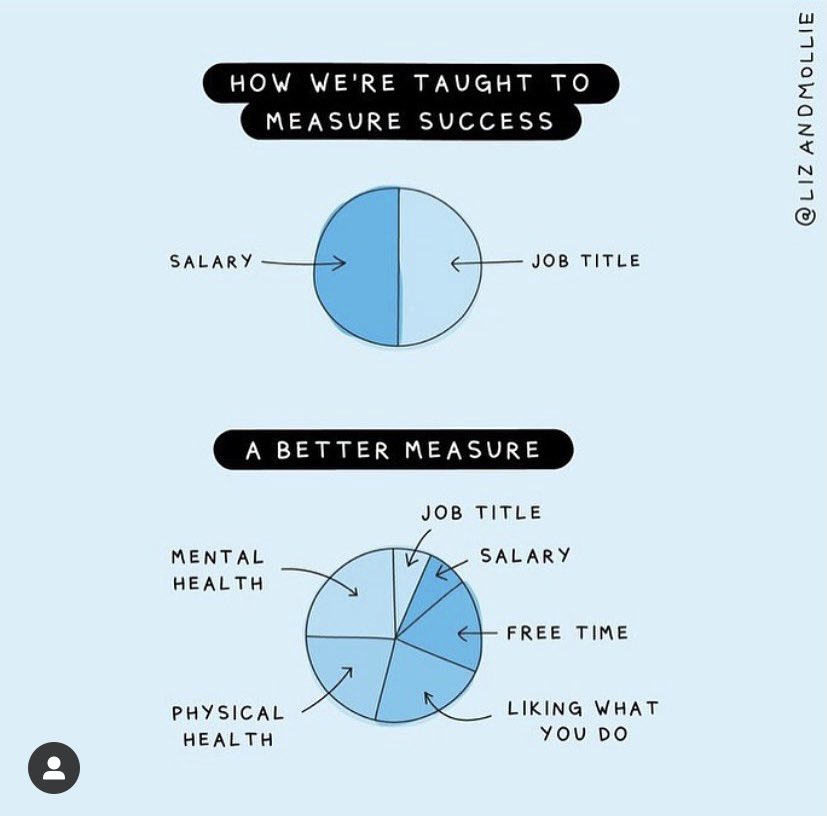How we measure success is not always aligned with what we value or what we actually need to be “successful.” As I have been facilitating these conversations with some district leadership teams and identifying their ideal learner profiles, we have also been exploring what success would really look like. I came across this image from @LizandMollie on Instagram and this resonated a lot. I shared it last week in my newsletter and got a lot of feedback on shifting the view of success in education and I wanted to go deeper on this topic and connect it to what I have been reading lately.
What does success mean to you?
Really, think about this for a minute….
In pursuit of better metrics of “success” in education, I often ask educators this question and create time to discuss their answers. My goal is to make the thinking visible and align on what really matters in our work as educators, as leaders, and as citizens, and with the end goal in mind, work to get there. You might think an answer would be student GPAs, getting into the right college, getting an A on the unit test. Yet, no one ever says that. Instead, common responses are empathy, critical thinking, deep expertise, joy, relationships, effective communication, persistence, or some variation of these goals as this graphic depicts.

These responses align with a more holistic view of a student as a learner and a person, not a mark on an attendance record, test score, or GPA. Despite this infinite view of what we want and what we aspire to for our own children and our students, we often are just playing the finite game in school focused on short-term wins and successes that don’t always add up to the actual goals that are stated in our visions and strategic plans.
Success versus Mastery
I had been thinking about this as different measures of “success” but in a recent Dare To Lead podcast, Dr. Sarah Lewis pushed my thinking on success versus mastery. She shared, “if you go back to any generation and consider what theorem, what innovation, what artistic work stands to be celebrated, it isn’t a success, it is a work of mastery.” This description of success versus mastery made it so clear that what we are aiming for is mastery that is a longer goal of deep learning, successes but also failures, and the pursuit of something bigger that matters beyond a grade or a unit or a report card.
In her book, The Rise: Creativity, the Gift of Failure, and the Search for Mastery she describes:
Mastery is also not the same as success — an event-based victory based on a peak point, a punctuated moment in time. Mastery is not merely a commitment to a goal, but to a curved line, constant pursuit.
When I watch my own kids in the zone and in pursuit of mastery as opposed to completion, there is a stark contrast in their efforts, energy, and motivation. When Zack is playing Minecraft and I hear, “I died” (which by the way sounds like the ultimate failure to me) he doesn’t quit he takes what he learned and rejoins his friends, and more often than not I hear I died… and every so often he will run over and say, “I won” and then run back to his quest. Abby will make jewelry or some delicious treat. Some are better than others but she keeps improving in pursuit of mastery, not a grade.
Here is an example of this in education:
Success: GPA, college acceptance, complete the assignments, A+ of the final exam
Mastery: Expertise, Curiosity, Inclusion, Innovation, Empathy, Joy Problem-solving, Contribution
Mastery, according to Dr. Lewis is more aligned with what educators and parents tell me they want for children in education yet too often the success metrics of test scores, GPAs, and completion of work are what we narrowly focus on. These are metrics of success yet to get to mastery we need to create the space for there to be multiple points of failure, growth, and learning, and innovation in pursuit of mastery.
The Infinite Mindset
The problem, I think, is that sometimes when we see success as only the GPA or college acceptance rather than steps in the pursuit of a larger more personal journey, we lose purpose. I believe these larger aspirations of mastery will give more purpose and meaning to these short-term metrics of success that inspire learners to practice, work hard, and navigate failure and learn.
Simon Sinek describes the difference in his book, The Infinite Game:
“Finite games, like football or chess, have known players, fixed rules, and a clear endpoint. The winners and losers are easily identified. In infinite games, like business or politics or life itself, the players come and go, the rules are changeable, and there is no defined endpoint. There are no winners or losers in an infinite game, there is only ahead and behind.”
This begs the question, What if we were more focused on mastery and saw current measures of success as part of the journey, not the destination?
In contrast, “The leaders who embrace an infinite mindset, in stark contrast, build stronger, more innovative, more inspiring organizations. Their people trust each other and their leaders. They have the resilience to thrive in an ever-changing world, while their competitors fall by the wayside. Ultimately, they are the ones who lead the rest of us into the future.”
So what if we revised this for our purposes in education to say:
Educators who embrace an infinite mindset develop stronger, more innovative, and inspired learners. Their learning communities trust each other and they have the resilience to thrive in an ever-changing world. Ultimately, they are the ones who will lead the rest of us into the future.



I love the graphic Katie! I see the shift occurring from the top to the bottom of the graphic only if we can let students take the wheel and participate in activities that are relevant to them and make a difference; participating in a start-up business, a community improvement project, etc. Thought-provoking as always – thanks!
I agree with the need to focus on mastery rather than ‘test scores’. However, in our neoliberal world the powers that be will want to know how well we are doing in ‘achieving mastery’ – they will still want metrics so they can see that the money being spent is having an impact. So the killer question is what are the metrics if achieving mastery is the goal? How do you measure mastery in ways that meet the requirements for effective summative assessment (https://halfbaked.education/characteristics-of-effective-summative-assessment/). My answer is to look at non-standardised metrics – for example see https://halfbaked.education/what-is-point-of-learning-pol-moving-beyond-standardised-testing/ or https://halfbaked.education/from-standardised-testing-to-living-cvs/
Mastery is a continual process and the end goal. Success are peak moments in attaining mastery skills.